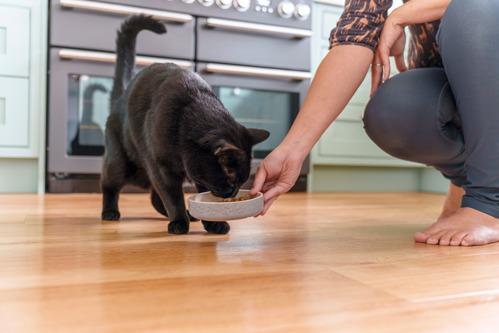Why a vegetarian or plant-based diet is not safe for cats
With more people exploring the benefits of vegetarian and vegan diets, you might wander if these diets are suitable for cats too.
While humans can exist perfectly well without eating meat, cats are carnivores and need meat to survive. A vegetarian or vegan diet is inappropriate for cats as it would make them very unwell. Registered Veterinary Nurse Helen Crofts explains what you should feed your cat to keep them healthy.

Why are cats carnivores?
For many thousands of years, cats have existed on a diet of mainly small mammals that are high in fat and protein. As a result, a cat’s body has evolved to digest a meat-based diet. Their digestive system is comparatively shorter than that of other species which eat plants and vegetables.
Cats also do not have the enzymes needed to produce many essential nutrients themselves. They are a lot less flexible when it comes to their diet. They need meat in their diet to provide necessary proteins, vitamins and essential fatty acids.
A plant-based diet is unlikely to be high in fat and may not be as high in protein. Any protein present would be very different to meat-based protein. It is also likely to be higher in carbohydrates. For these carbohydrates to be broken down a specific enzyme called amylase is needed. In the saliva, the pancreas and the gut, cats have far less amylase than other species such as humans and dogs. This means that these diets will be much harder for a cat to digest and extract nutrients from.
There are 22 different amino acids that form the building blocks of all proteins within the body. Essential amino acids are those which an animal cannot produce themselves. They have to source them from their diet. There are 11 essential amino acids in cats and one of the most important is called taurine. This amino acid is found only in meat and fish.
Does vegetarian/vegan cat food exist?
There are pet foods that are marketed as vegetarian/vegan and suitable for cats. But Cats Protection would not recommend feeding these to your cat. Cats cannot survive on only vegetables.
Instead, look for a complete cat food produced by companies registered with UK Pet Food (previously the Pet Food Manufacturers Association). It should say ‘complete’ on the packaging. These foods will contain all the nutrients your cat needs to stay healthy. Find out more about what to feed your cat.
What happens to cats if they don't eat meat?
Cats need a good supply of the amino acid taurine and other essential nutrients that can only be found in meat. If they do not get these nutrients, a cat’s health will start to deteriorate as various parts of the body struggle to function. A taurine deficiency will have serious consequences.
Symptoms of taurine deficiency
- Blindness. The first area to be affected is the eye. Photoreceptor cells in the retina, the area at the back of the eye, need taurine to work correctly. Blindness may be one of the early symptoms of taurine deficiency.
- Heart disease. The muscle of the heart depends on taurine. Over time a lack of taurine in the diet will reduce the ability of the heart to pump blood. This can lead to significant heart disease and sometimes death.
- Developmental problems in kittens
- Supressed immune system
- Increased risk of blood clots
Are cats allowed to eat vegetables?
Cats can eat a small amount of some vegetables. Indeed, some meat-based cat foods contain vegetables. Some cat foods contain vegetables to add fibre to cats’ diets. It can also add bulk to the food, helping cats feel fuller without adding lots of unnecessary calories from extra protein or carbohydrates.
Vegetables that cats can eat:
- carrots
- peas
- corn
- broccoli
- spinach
Cats should not eat onion or garlic as these vegetables are toxic to cats and can make them unwell. Find out more about which foods cats can and can’t eat.
Cats will sometimes eat grass and this is perfectly fine for them to do. It can even have some benefits. But cats do not need vegetables or grass added to their food. Find out why cats eat grass.



